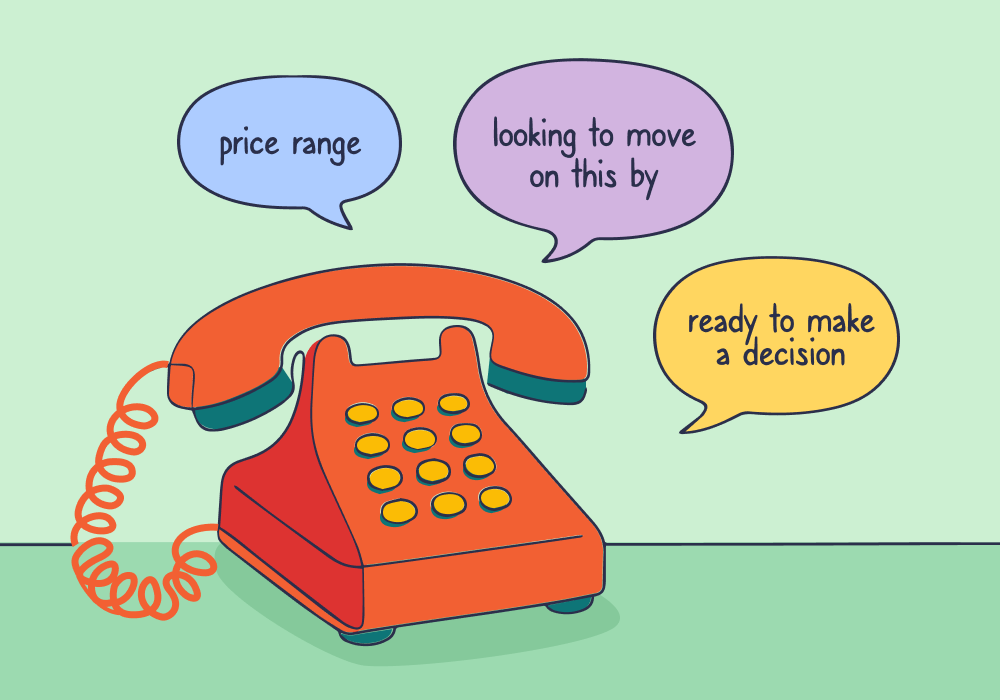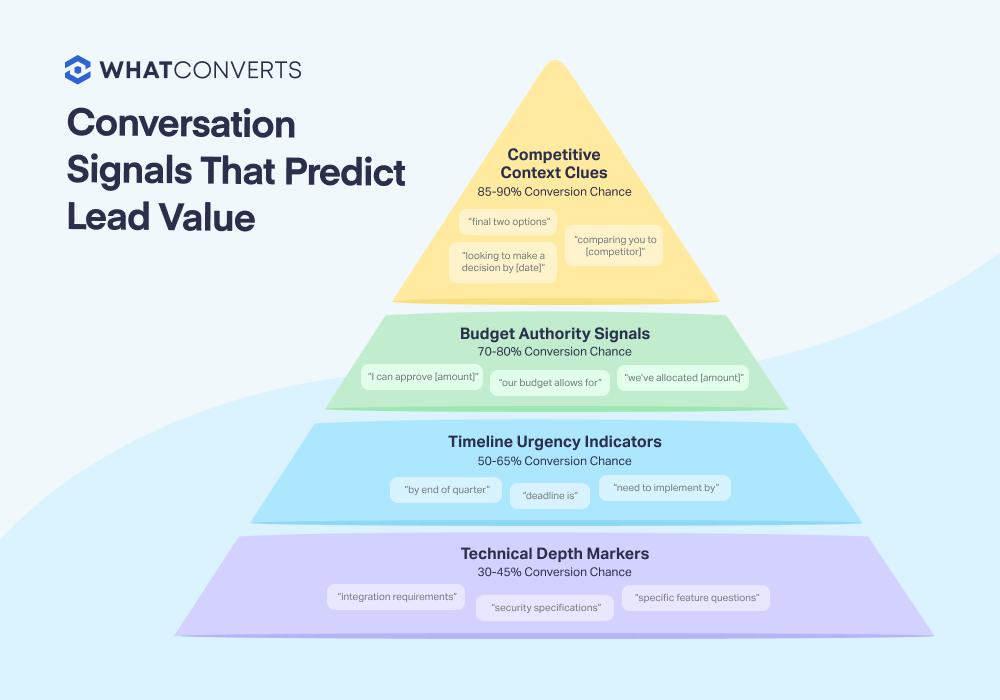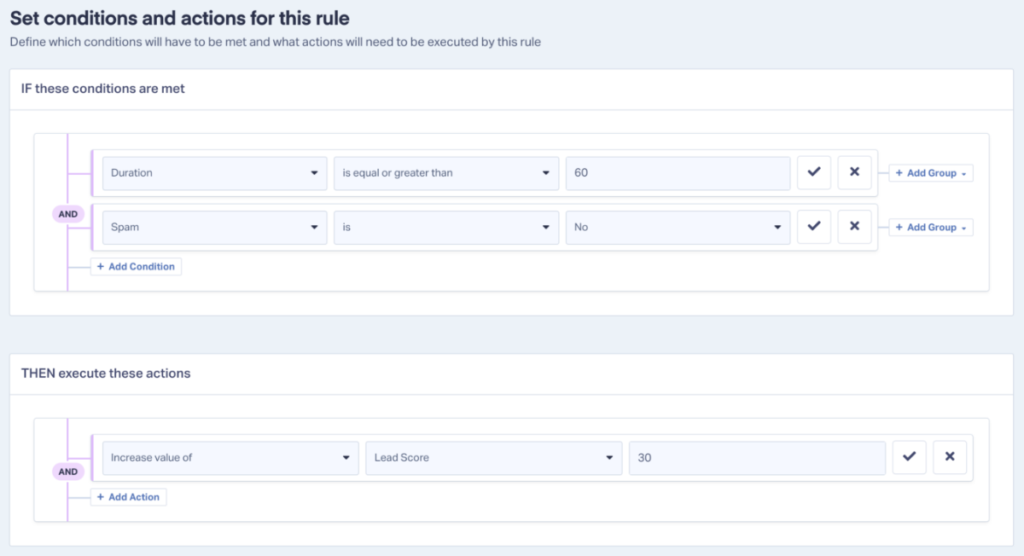
Call intelligence uses AI to automatically analyze call conversations, extracting insights about what prospects actually say during calls.
While most marketers rely on behavioral signals like page visits and downloads for lead scoring, what prospects say during calls—their budget authority, timeline urgency, and technical questions—often reveals buying intent more accurately than any clickstream data.
That’s where automated call intelligence comes into play. With today’s technology, marketers can train their AI tools to automatically evaluate call transcripts, spot keywords, identify buyer intent, and synthesize that data into lead scores that separate legitimately hot leads from time-wasters.
Read More: How Repeat Digital 3X’d Revenue by Boosting Call Conversion Rates [Case Study]
What Is Call Intelligence?
Call intelligence is technology that automatically analyzes sales conversations and extracts actionable insights about prospect behavior and buying intent. Instead of interpreting indirect signals like page visits or email opens, call intelligence allows marketers to make decisions based on what prospects actually say during calls, demos, and other conversations.
Call Intelligence vs. Conversation Intelligence
Call intelligence and conversation intelligence overlap heavily but have a few nuanced differences. Conversation intelligence is a broad term that covers all of the ways AI can capture and analyze conversations across calls, chats, emails, and demos and pull out insights like sentiment, intent, or even coaching opportunities.
Within that broad umbrella, call intelligence focuses specifically on inbound and sales-related phone calls, analyzing exactly what prospects say to reveal buying intent, urgency, and authority. Within WhatConverts, this focus means your call data doesn’t just get analyzed—it gets tied directly back to ROI, helping you prioritize the right leads and optimize ad spend.
Benefits of Call Intelligence vs. Behavioral Lead Scoring
Sure, call intelligence is helpful for lead scoring—but if you already have behavioral lead scoring in place, is it really necessary?
Yes, it is. Let’s see what insights we glean from behavioral lead scoring vs. call intelligence scoring:
The Behavioral Lead Insights
You’re currently dealing with three in-progress leads. Here’s what you’ve learned using behavioral signals:
- Lead A (highest behavioral score): visited the pricing page five times, downloaded three resources, and had a 20-minute product demo call
- Lead B (medium behavioral score): visited the website twice, downloaded one whitepaper, and requested a call
- Lead C (zero behavioral score): single website visit, no downloads, one direct phone call
If you’re measuring using traditional behavioral metrics, you’re going to invest the most energy in nurturing Lead A and pay less attention to Lead B and Lead C.
The Call Intelligence Insights
When you include data from the three leads’ calls, you see a very different picture:
Lead A:
- Said they were price shopping across six different competitors
- Asked generic questions
- Mentioned that they were “just starting to look around”
- When pressed about timeline, said they were “hoping to maybe do something next year.”
Lead B:
- Mentioned needing to “implement by the end of Q4”
- Asked specific technical questions about integrations with their existing systems
- When discussing budget, referenced “the allocation we have for this project”
Lead C:
- Used language indicating both authority and urgency
- Mentioned phrases like, “I need to solve this problem quickly,” “I can approve this,” and “what would implementation look like if we started next month”
The Takeaway: Behavioral Insights Lead to Incomplete Conclusions
When it comes to lead scoring, working with behavioral data isn’t just about not getting the complete picture—it’s about getting a picture that actively suggests something that isn’t true. The conclusions drawn using behavioral data and those drawn using call intelligence could be polar opposites.
And only call intelligence can be reliably trusted to lead you toward pursuing the right prospects.
How to Score Leads Using Conversation Signals
The examples above show how dramatically conversation data can change your understanding of lead quality. But to systematically replicate those insights across all your leads, you need a framework for identifying and scoring the conversation signals that actually predict conversion.
Not all conversation signals carry equal weight. Some phrases indicate immediate buying intent, while others suggest prospects are still months away from making decisions. The key is to categorize these signals based on what they reveal about a prospect’s readiness and ability to buy.
Here are the four categories of conversation signals that most reliably predict conversion success:
Budget Authority Signals
Budget authority keywords are your strongest conversion predictors. Phrases like "I have the budget," "I can sign for this," or "my budget allows for" indicate decision-making power—exactly what separated Lead C from the others. Contrast this with "I need to check with my partner" or "not sure how much we’re willing to spend," which signal lengthy approval processes.
Timeline Urgency Indicators
Timeline-related keywords reveal when prospects plan to make decisions. High-value phrases include "by end of quarter," "deadline approaching," and "need to implement quickly." Vague language like "eventually" or "down the road" indicates perpetual evaluators rather than buyers.
Technical Depth Markers
Keywords related to technical specs separate serious evaluators from casual browsers. Specific questions about features, integrations, or implementation details demonstrate genuine consideration. Generic questions like "What do you do?" typically indicate early-stage research.
Competition Context Clues
Questions about competitor comparisons show what stage the prospect is at in their evaluation. Early-stage language like "looking at everything" suggests months until purchase, while "final two options" or "ready to decide between you and X" indicates active decision-making.
By scoring leads based on these conversation signals, you can avoid the misleading conclusions that behavioral data alone might suggest. A prospect with high website engagement but low conversation scores might be a tire-kicker, while someone with minimal behavioral activity but strong conversation signals could be your next biggest deal.
Setting Up Call Intelligence-Based Lead Scoring with WhatConverts
A good call intelligence system:
- Captures conversation data
- Identifies meaningful signals
- Sets up automated rules that translate those insights into actionable lead scores
While many platforms can record and transcribe calls, WhatConverts goes further by letting you create custom Lead Intelligence rules that automatically analyze conversation content and take specific actions based on what prospects say during calls.
For example, you can input a series of keywords and phrases and use Lead Intelligence rules to instruct WhatConverts to take actions like:
- Marking a lead as “quotable”
- Assigning a lead score
- Adding a dollar quote value
- Sending the quotable lead to Google Ads as an enhanced conversion
Here’s how to set it up:
Start with Comprehensive Data Capture
WhatConverts automatically records and transcribes calls that come in from all of your marketing channels—Google Ads, organic search, social media, email campaigns, and direct traffic. This creates a unified database of conversation content tied to specific marketing sources that can keep all conversion data for a particular lead grouped together, rather than having a lead’s many conversion actions documented in separate siloed databases.
Set Up Automated Lead Intelligence Rules
WhatConverts’s Lead Intelligence feature allows you to use IF/THEN logic to automatically analyze raw call data and take actions based on what it finds. When a new lead comes in, the system checks call transcripts, duration, and other conversation data against your predefined rules.
You create rules to do things like:
- Filter spam: IF call duration is >30 seconds, THEN mark lead as “Spam - No”
- Qualify leads: IF caller zip is “85364,” THEN set mark lead as “Quotable - Yes”
- Value lead quotes: IF transcript contains “A/C repair,” THEN set Quote Value to $1,000
- Adjust lead priority: IF transcript contains “urgent,” increase Lead Score by 50
Compound and Stack Rules for Efficiency
To use Intelligence rules effectively, you’ll want to build out compound rules—for example, you wouldn’t actually consider a caller qualified based solely on the fact that they live in your service area. Instead, you might build out a ruleset that looks something like this:
| IF: | THEN: | |
| Rule 1 | Call duration is > 30 seconds AND Caller zip is 85364 AND Call transcript contains “A/C,” “HVAC,” “heating,” “cooling” | Set value of Spam to No AND Set value of Quotable to Yes |
| Rule 2 | Call transcript contains “A/C repair” | Set value of Quote Value to $1,000 |
| Rule 3 | Call transcript contains “urgent,” “as soon as possible,” “ASAP,” “emergency” | Increase value of Lead Score by 50 |
Deploy AI Lead Analysis for Advanced Call Intelligence
For even deeper insights, you can create rules that trigger AI Lead Analysis, which is a feature that evaluates a call transcript and generates a series of outputs including:
- Lead Summary
- Topic Detection
- Intent Detection
- Keyword Detection
- Sentiment
With this information added to the lead profile, you can build new rules that are triggered when the lead is updated and execute actions based on Lead Analysis data. These more powerful rules can be used to assess lead signals more broadly: instead of checking the raw call transcript for exact match keywords like “A/C repair,” you can check the lead analysis topic detection for anything related to the caller’s air conditioner being broken or needing to be fixed.
Create Automated Response Workflows
Lead Intelligence rules can be used for more than just updating lead qualification, value, and scoring data. You can also build rules that send data or webhooks to other applications. This allows you to do things like send qualified conversions to your ads platform for bidding algorithm optimization or send instant notifications to sales representatives when you receive a call from a high-urgency lead.
In other words, WhatConverts doesn’t just enable you to evaluate your leads more efficiently—it also gives you tools to act on that assessment with the speed and accuracy necessary to capitalize on any business opportunity right away.
Using Call Intelligence to Optimize Lead Generation
Setting up call intelligence for lead scoring is just the beginning. The real power emerges when you use those conversation insights to improve your marketing strategy and attract better prospects from the start.
Once you've identified which conversation patterns predict conversion success, you can work backward to optimize your campaigns for the language and behaviors that high-value prospects actually exhibit. Instead of just scoring leads after they convert, you can proactively shape your lead generation to attract more qualified prospects while filtering out leads that won’t ever convert.
Send High-Quality Leads Back to Ad Platforms
Traditional conversion tracking tells Google Ads that someone filled out a form or made a call, but it can't distinguish between valuable prospects and time-wasters. Call intelligence changes this by identifying which conversions actually represent qualified leads.
WhatConverts can automatically send only your highest-scoring conversions back to Google Ads as enhanced conversions. Instead of training Google's algorithm on all phone calls, you're training it specifically on calls that contained budget authority language, timeline urgency, or other high-intent signals.
This creates a feedback loop where Google's automated bidding increasingly targets prospects who are likely to have qualifying conversations, rather than just prospects who are likely to call.
Read More: How to Optimize Google Ads to Only Target Qualified Leads
Optimize Ad Copy Based on Conversion Language
Analyzing successful conversation patterns reveals the specific concerns, priorities, and language that your best prospects use. You can incorporate these insights directly into your ad copy and landing page content.
If high-converting prospects frequently mention "Q4 deadlines" or "enterprise security requirements," you can test ad copy that speaks to those specific concerns. If qualified leads consistently ask about "integration capabilities," you can create landing pages that prominently address integration features.
This alignment between your marketing message and prospect priorities increases the likelihood that your campaigns will attract prospects who are already thinking in terms that lead to an actual purchase.
Build Negative Audiences from Low-Intent Patterns
Just as valuable as identifying high-intent language patterns is recognizing the conversation signals that predict low conversion probability. Prospects who consistently mention they're "just getting quotes" or "looking at all options" rarely convert, regardless of their other behaviors.
You can use these patterns to build negative audiences and exclusion criteria for your campaigns. This prevents you from repeatedly targeting prospects who exhibit conversation patterns that historically lead to wasted sales effort.
The compound effect of these optimizations means your call intelligence system doesn't just help you score leads more accurately—it actively improves the quality of leads entering your pipeline by aligning your marketing strategy with the conversation patterns that actually predict revenue.
Ready to discover what your leads are actually telling you?
Start your free 14-day trial of WhatConverts today or book a demo with a product expert to see how we help prove and grow your ROI.
Get a FREE presentation of WhatConverts
One of our marketing experts will give you a full presentation of how WhatConverts can help you grow your business.
Schedule a Demo
Grow your business with WhatConverts







